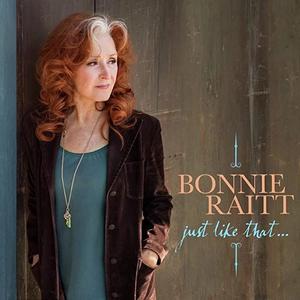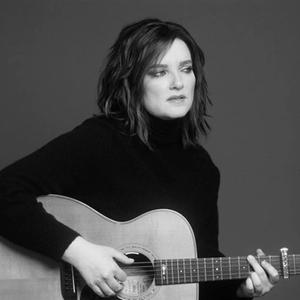




Link copied

In the glow of Bonnie Raitt's lifetime as a universally adored stateswoman of blues-rock, it's a little strange to think that her records were once on a downward slide from critical acclaim to the bargain baskets.
After her exciting emergence half-a-century ago as an embodiment of blues-roots authenticity and maturity beyond her years, her records from the mid-1970s through most of the 80s were sadly ruled by the law of diminishing returns.
But to anyone who ever recognised her as a cool blues rocker and one of the greatest slide guitarists known, she saved both herself and her career in one nimble move.
It gives us all the more reason to do the latter, as we invite you to leaf through Bonnie's back pages:
Thank You
From the get-go, Raitt's instincts were to infuse her unimpeachable credentials as a new blues ambassador with ingredients from the worlds of pop, soul, rock and the new singer-songwriter era. That's why her self-titled 1971 debut included Stephen Stills' ‘Bluebird’, a tune recorded by Motown's Marvelettes, Robert Johnson's ‘Walking Blues’ and two covers of 1920's “Texas Nightingale” by Sippie Wallace.
On a spontaneous LP recorded partly live when she was just 21, she also contributed her first two self-penned songs, of which ‘Finest Lovin' Man’ is bona fide raunchy blues. Our choice, ‘Thank You’, is cut from more contemporary cloth; its graceful changes and soulful vocals hinting at glories to come.
Love Has No Pride
This sumptuously sad ballad was written by the undeservedly lesser-known Eric Kaz and Libby Titus. It served notice of Raitt's foolproof radar for the right type of song for her, with Kaz joining the original circle of composers (which also included Jackson Browne and Chris Smither) whose work she especially admired.
Elsewhere, she also interpreted Kaz's ‘Angel’, ‘Cry Like A Rainstorm’, ‘River of Tears’ and another gem that we'll come to in a short while. This closing track from Bonnie's second album displayed her uncanny ear for a lyric, as she explores the almost heroic desolation of romantic defeat (“Love has no pride when there's no one left to blame / I'd give anything to see you again”).
Write Me A Few Of Your Lines/ Kokomo Blues
The album-a-year schedule of the 1970s brought a splendid third LP that covered the waterfront, from soul (Martha & the Vandellas' ‘You've Been In Love Too Long’) via calypso (‘Wah She Go Do’) to singer-songwriter, with songs contributed by Browne and Randy Newman.
Bonnie's beloved blues lineage was also admirably represented, both with Mose Allison's ‘Everybody's Cryin' Mercy’ and this skilfully segued tribute to another of her guiding lights, Mississippi Fred McDowell. A-list album contributors also included Van Dyke Parks, Taj Mahal and most of Little Feat. The bottleneck, electric and acoustic guitars were all the artist's own.
Angel From Montgomery
John Prine's immortal composition from his debut album, one of his first vignettes to make poetry out of real life, has become an endlessly remade Americana staple. It's little remembered that it was first covered by John Denver, but when Bonnie got to the song, she took up permanent residence.
I remember her playing it at a London show in the early 1990s when, as she does at every show for almost every writer she covers, she gave generous thanks to its creator. Everyone has done it since, from Tanya Tucker to Carly Simon to Old Crow Medicine Show, yet it goes without saying that Raitt's is the unassailable interpretation.
I'm Blowin' Away
More exquisite melancholy from the pen of Eric Kaz. One could easily fill an entire Raitt playlist with such superior, soul-baring heartbreakers, on which she seems to bare her very soul.
Listen for the magnificent string and horn arrangement by Nick De Caro, and the dream-team harmonies of Emmylou Harris, Jackson Browne and J.D. Souther. It's Raitt's supremely supple and evocative lead vocals that make this a focal point of her fifth studio release.
Home
Two years after, an album arrived that first made me aware of such a singular talent, especially when I bought the single from it - a slinky remake of Del Shannon's pop classic ‘Runaway’. Even the label, the famous old artwork announcing “Burbank, Home Of Warner Bros. Records,” was alluring.
Flipping the 45, you found a bonus feature, in the shape of this beguiling love letter to the joys of home. It was written by yet another underrated singer-songwriter of the day, Californian soft-rock songbird Karla Bonoff, who was also much favoured by Linda Ronstadt.
The Glow
Our heroine moved out of the 1970s and into the era of digital recording with her seventh album. It was full of sexy soul, starting with two Isaac Hayes & David Porter tunes - Sam & Dave's ‘I Thank You’ and Mabel John's ‘Your Good Thing (Is About To End)’.
The single was a rocking version of Robert Palmer's ‘You're Gonna Get What's Coming’, but we make no apology for choosing another stunning slow number. ‘The Glow’, written by Veyler Hildebrand, is one of the countless precious stones embedded deep in Raitt's awesome inventory, featuring a superb vocal performance of a sophisticated, late-night jazz delicacy.
Keep This Heart In Mind
Disappointed by the lukewarm response to The Glow, Raitt changed gear for Green Light, her first album of the 1980s. Here, she teamed with rock producer Rob Fraboni, on a record she remembers with more fondness than many of her other studio endeavours.
Still working largely from outside material, she tried Bob Dylan's ‘Let's Keep This Between Us’ and even Eddy Grant's ‘Baby Come Back’. Fred Marrone and Steve Holsapple's spirited ‘Keep This Heart in Mind’ again had Jackson Browne hands across it, alongside the featured saxophone of David Woodford.
Nick Of Time
Rarely has an album been so aptly titled. Masterfully overseen by Don Was, Nick of Time reset Raitt's creative compass just as she was disappearing into the long grass, having been dropped by Warner Brothers and mired in personal problems.
Admirer Prince had set up what became an ill-starred dalliance with Paisley Park Records, but that uncertain road eventually led to Capitol Records, three Grammys and five million sales. Was, superb at divining the very core of an artist's talent, took the production back to basics, and outstanding song choices (John Hiatt, Bonnie Hayes, David & Julia Lasley and others) were complemented by his confidence in her own songwriting.
Hence a wonderful title track in which an older, wiser Bonnie reflects with autobiographical humility on the passing years, ending up with a prize she never dreamed of.
Something To Talk About
Far from being a flash in the pan comeback, Nick Of Time completely redrew the map of Raitt's national and international appeal. When the follow-up album emerged two years later, this time listing her as co-producer with Was, it was even more successful, and was seven-times platinum in America alone before the end of the 1990s.
Reborn as a writer, she contributed four songs of her own to sit with Paul Brady's title-track, Hiatt's ‘No Business’, Womack & Womack's ‘Good Man, Good Woman’ (featuring Delbert McClinton) and others. Canadian Shirley Eikhard's whip-smart ‘Something To Talk About’ was a worthy first single; a fabulous showcase for Bonnie's peerless slide guitar, it was the biggest US hit she ever had, reaching No. 5.
I Can't Make You Love Me
Also on Luck Of The Draw was this stunning ballad and second single, an adult song of love and loss that cuts to the centre of a broken romance like open-heart surgery.
It was composed by country songwriters Mike Reid and Allen Shamblin and cast Raitt's aching vocals against the piano and additional keyboards of Bruce Hornsby. Anyone who doesn't shiver at lines like “You can't make your heart feel something it won't” needs to check their pulse.
Longing In Their Hearts
Raitt’s next album came striding into view with another US pop hit in the ’Something To Talk About’ vein - Tom Snow and Jimmy Scott's ‘Love Sneakin' Up On You’. At this time, Bonnie was favouring British and Irish writers such as Richard Thompson, Terry Britten and Paul Brady, but crucially her own pen was now in full flow.
One of her four credits was this co-write with her husband of the time, actor Michael O'Keefe, an everyday story of yearning that combined the best elements of rock and folk, heightened by George Marinelli's Stonesy guitar and his supporting mandolin. Throw in a we-are-not-worthy harmony vocal by Levon Helm, and you're in business.
I Can't Help You Now
Her multi-platinum status may have ebbed away by the turn of the century, but by now Raitt's place among the recording and performing elite was inviolable. For the second album in a row, after 1998's Fundamental, Tchad Blake and Mitchell Froom joined her on the production couch, and there was another smart nod to the big writer-artists of the day, in her cover of David Gray's title track.
Billboard marvelled at how she “deftly remains relevant in today's youth-centric contemporary pop scene.” This pleasing lead single was penned by Tommy Sims, Gordon Kennedy and Wayne Kirkpatrick, the team behind Eric Clapton's ‘Change the World’, and you can hear the echoes.
Used To Rule The World
Slipstream had Raitt co-producing with Joe Henry on a complete album of interpretations, on which she turned to favoured writers Dylan and Brady. Hailed as one of her best releases in many years, it went on to win a Grammy as Best Americana Album, acknowledging a latter-day genre name for a sound that she fundamentally helped to invent.
This supremely funky opening track was an inspired choice, written by the seemingly effortless style of Randall Bramblett and perfectly suited to a sixty-something kindred spirit. It has her cutting electric and slide shapes for fun alongside road band guitarists Johnny Lee Schell and George Marinelli, with extra glide stemming from Mike Finnigan's Hammond B3 stride.
All Alone With Something To Say
Bonnie's most recent, 17th studio set welcomed her back as a contributing writer, on no fewer than five of its 12 titles. The album and its ensuing tour, including a triumphant night at London's Hammersmith Apollo, saw her at the pinnacle of her form, in fantastic voice and having the time of her life. Intelligent writers of grown-up material are drawn to her like bees to pollen, as on Steven Dale Jones and Gordon Kennedy's wondrous and wistful ‘All Alone with Something To Say’.
It sees life through the prism of experience with all its ups and downs, by an artist who has never been anything but true to her inspiring spirit. As she told me back in that 1994 interview: “There are people that love you for life and they’re going to get you. So, I’m never going to have to do something else for a living so long as, God willing, my voice and my guitar playing holds up”.
Subscribe and listen to Holler's Guide To: Bonnie Raitt playlist below:

For more on Bonnie Raitt, see below:





